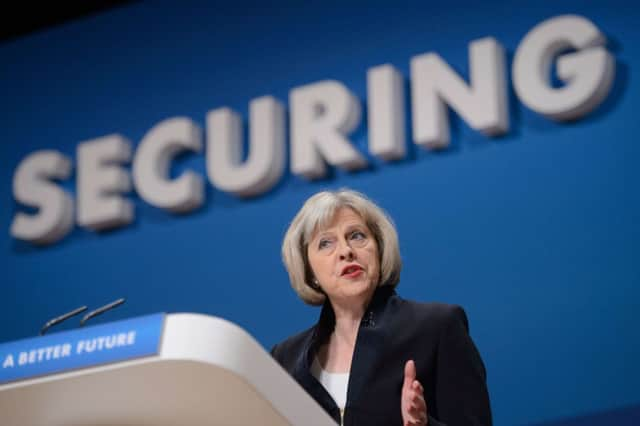Tiffany Jenkins: Tory plans are threat to democracy


EVERY political speech contains at least one “but”, carefully inserted so that the speaker appears to say something principled but actually means something opposite to it. Theresa May’s speech, delivered to the Tory party conference this week, is no exception. Up until the “but”, it wasn’t going too badly, considering she is the Home Secretary. Then she went and spoiled it all by saying that she wanted to champion British values, but would do so by giving up on those values.
May began confidently on stop and search, making the point that young, black men are more likely than the white conference attendees of a certain age to be stopped by the police. This unequal and iniquitous treatment is why May valiantly reformed the process, strengthening the rules and safeguards, she explained, thus highlighting the party’s anti-racist credentials; a useful ploy before talking about lowering immigration and tackling radical Islam. No-one, she vowed, should ever be stopped and searched because of the colour of their skin, promising further action – legislation – if needed.
Advertisement
Hide AdAdvertisement
Hide AdThe Home Secretary then made a few sensible observations about so-termed British values, primarily democracy, a principle she championed as essential, alongside the rule of law, equality between citizens regardless of their gender, ethnicity, religion or sexuality, as well as free speech and respect for minorities. These important values, she said, after listing them, make our country what is it, predicting that they will prevail in the fight against terrorism and extremism.
So far, not all that bad, really. Theresa May has a point that the battle against terror isn’t really a military one – it is a war fought for hearts and minds, a battle of ideas. And she is right that we need to defeat the ideology behind the terrorist threat; that this cannot be done by air strikes or boots on the ground, were anyone even willing. That is highly significant if, as believed, more than 500 British citizens have travelled to fight in Syria since 2011. Many are thought to have joined Islamic State (IS), including a privately educated young girl born in Glasgow to a good family. We also know that the recent outrageous acts of murder have been committed by men with British accents, and that the 7 July suicide bombers were young Britons.
There is a push as well as a pull when it comes to attracting the attention and dedication of possible jihadi recruits. Something is rotten within our culture, which means some turn away from it, looking for something else. Without suggesting that it’s simple, we need to win people who are at risk of radicalisation over to our ideals and beliefs. This means mounting a strong, public and convincing case for those ideals and beliefs. The problem is, it is a case that is noticeably absent in public life.
There is a great deal of talk at the moment about British values. They should be taught in schools, we are told. They will help us to combat terrorism, it is said. What we rarely hear, however, is the elaboration of what those values are, why they matter and how they are relevant to our lives. Instead, we hear these values limply evoked, as if they are from a script written by someone else a long time ago, such as the list-like approach in May’s conference speech. And, more often than not, we see our political leaders disregard or even ditch these values, which is exactly what May did in the same address to the Conservative conference.
After celebrating certain British values, May proceeded to detail how they were to be undermined. A future Conservative government would seek new powers to ban extremist groups and curb the activities of “harmful” individuals, she said. The new measures will be targeted at people and groups who “stay just within the law but spread poisonous hatred”. Groups that cannot currently be proscribed will be subject to banning orders should ministers “reasonably believe” that they intend to incite religious or racial hatred, to threaten democracy or if there is an urgent need to protect the public from harm, either from a risk of violence, public disorder, harassment or other criminal acts.
Groups which incite violence are already banned. May proposes to regulate those groups who are already working within the law, when a minister “reasonably believes” they “intend” to “threaten democracy” or cause “harassment”, all of which is vague, subjective and subject to a very low standard of proof – way too low. Creating a public disorder is also what perfectly legitimate protest groups may want to do, and reasonably so. As one political commentator pointed out, all sorts, including the Socialist Workers Party and anti-abortion activists, could easily be targeted with these “banning orders” and “extremism disruption orders”. Not happy with just restricting political protest, May also announced plans to resurrect the Communications Data Bill, which would give police and security services wide-ranging internet surveillance powers, and confirmed that a new counter-terrorism bill, which would allow for the confiscation of passports of Britons who travelled to fight in Iraq and Syria, will be introduced in November.
There is no need for these extra powers. And they are likely to be used inappropriately. Past experience shows that once the law is extended for one reason, often terrorism, it is applied elsewhere. The Regulation of Investigatory Powers Act, intended to work in the interests of national security, was used by more than 12 local authorities to monitor dog owners whose animals were suspected of dog fouling.
You cannot promote liberal values by introducing state powers that undermine liberal values. Showing the world that we lack the conviction and belief necessary to hold true to these principles is no way to win anyone at home or abroad to these vital principles – to our way of life. It is these proposals that are the true threat to democracy.